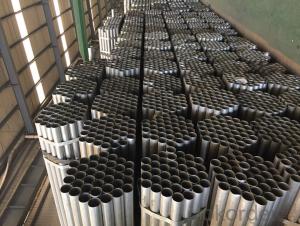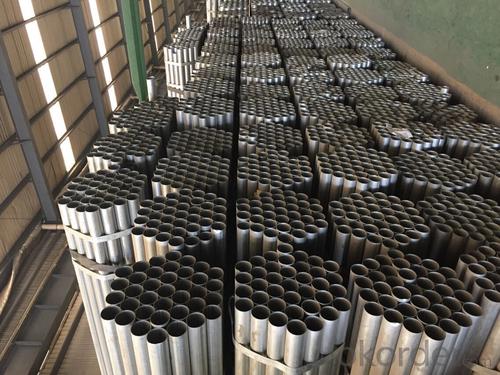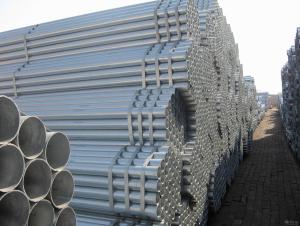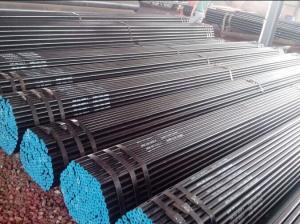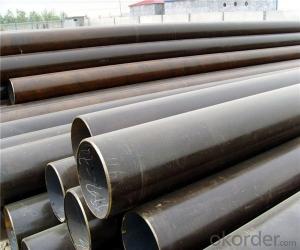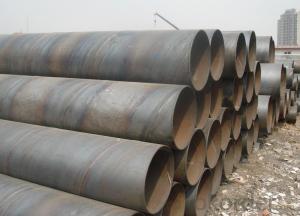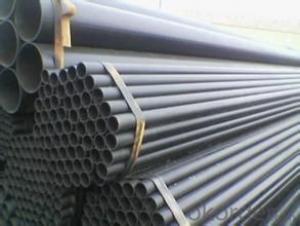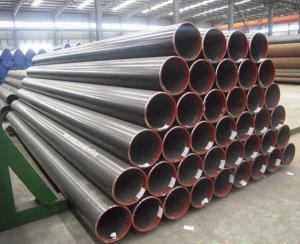Sales of various types of stainless steel tube
- Loading Port:
- Tianjin
- Payment Terms:
- TT or LC
- Min Order Qty:
- 40 m.t.
- Supply Capability:
- 10000 m.t./month
OKorder Service Pledge
OKorder Financial Service
You Might Also Like
Product Description:
1、Structure of Stainless Steel Welded Pipe ASTM A358/A312/A778 Description:
Stainless steel welded pipe is actually a cover term, covering a wide range of alloy and making them suitable for different attributes that are used in a very wide and large numbers of different industries. Stainless steel pipe is resistant to erosion, highly flexible, powerful, easy to use, and can be done in distinct approaches, which means that more and more stainless steel was used as a construction material for large-scale, high impact buildings. It can be molded, rolling, and it can create amazing shapes to make it perfect, It is used as experimental buildings, The use of steel pipe welding of large stainless steel covers other examples.
2、Main Features of the Stainless Steel Welded Pipe ASTM A358/A312/A778:
• High manufacturing accuracy
• High strength
• Small inertia resistance
• Strong heat dissipation ability
• Good visual effect
•Reasonable price
3、Stainless Steel Welded Pipe ASTM A358/A312/A778 Images:
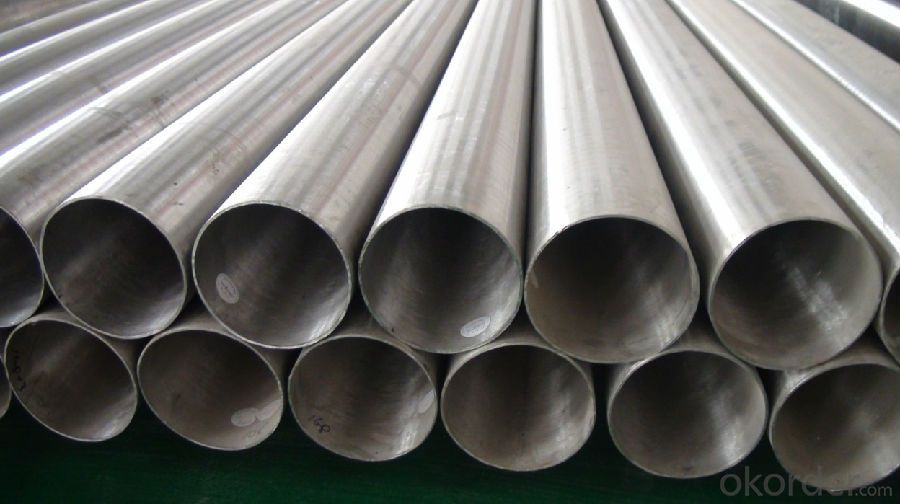
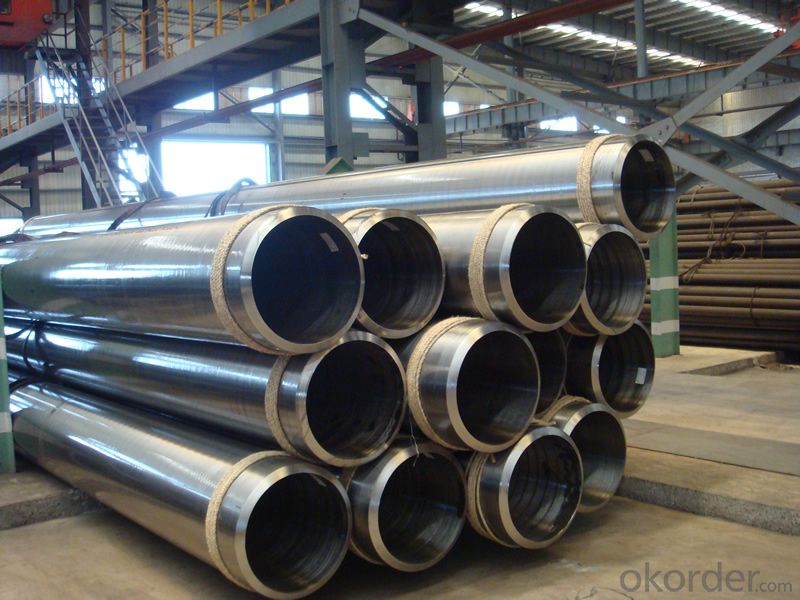
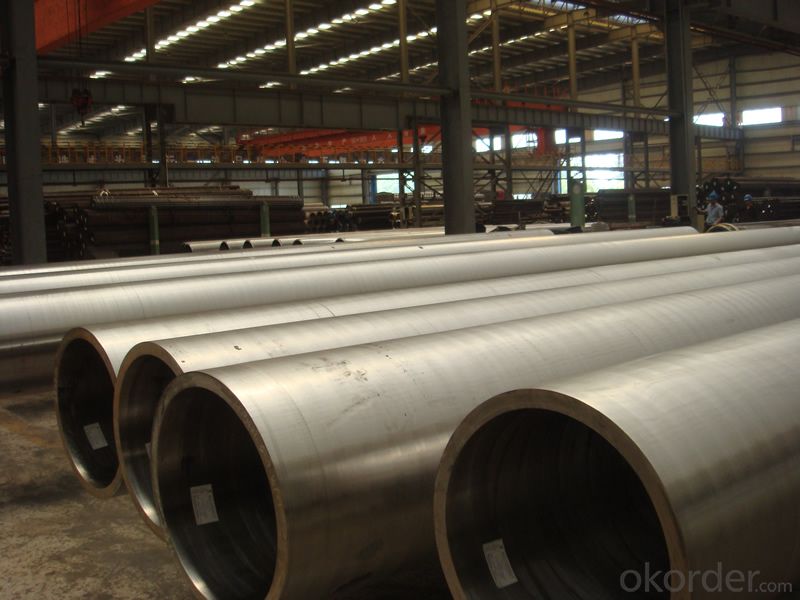
4、Stainless Steel Welded Pipe ASTM A358/A312/A778 Specification:
Size:
| Outside diameter | Outside | Thickness | ||||
| SCH 5S | SCH 10S | SCH 20S | SCH 40S | |||
| (A) | (B) | mm | mm | mm | mm | mm |
| 350 | 14′ | 355.6 | 3.96 | 4.78 | 7.92 | 11.13 |
| 400 | 16′ | 406.4 | 4.19 | 4.78 | 7.92 | 12.7 |
| 450 | 18′ | 457.2 | 4.19 | 4.78 | 7.92 | 14.27 |
| 500 | 20′ | 508 | 4.78 | 5.54 | 9.53 | 15.09 |
| 550 | 22′ | 558.8 | 4.78 | 5.54 | 9.53 | 15.09 |
| 600 | 24′ | 609.6 | 5.54 | 6.35 | 9.53 | 17.48 |
| 650 | 26′ | 660.4 | 5.54 | 7.92 | 12.7 | 17.48 |
| 700 | 28′ | 711.2 | 5.54 | 7.92 | 12.7 | 17.48 |
| 750 | 30′ | 762 | 6.35 | 7.92 | 12.7 | 17.48 |
| 800 | 32′ | 812.8 | 7.9 | 12.7 | 17.48 | |
| 850 | 34 | 863.6 | 7.92 | 12.7 | 17.48 | |
| 900 | 36′ | 914.4 | 7.92 | 12.7 | 19.05 | |
| 1000 | 40′ | 1016 | 9.53 | |||
Tolerances on dimensions table:
| Standard | Outside(mm) | Thickness(mm) | Length(mm) | |
| ASTM A312 | ≤48.26 | -0.4 | +No special provisions(Unspecified)-12.50% | Appoint LengthDefinite cut length+6.40 |
| >48.26~114.30 | 0 | 0 | ||
| >114.30~219.08 | 0.8 | |||
| >219.08~457.20 | 1.6 | |||
| >457~660 | -4 | |||
| >660~864 | -5 | |||
| >864~1219 | -5.6 | |||
| JIS G3459 | <30.00 ±0.30≥30.00 ±1.00% | <2.00 ±0.20≥2.00 ±10% | Appoint LengthDefinite cut Length | |
| GB/T 12771 | <13.00 ±0.2013.00~40.00 ±0.30≥40.00 ±0.80% | ≤4.00 +0.50 -0.60>4.00 ±10% | 20 | |
| EN 10217-7 | D1±1.50% with±0.75mm(min)D2±1.00% with±0.50mm(min)D3±0.75% with±0.30mm(min) | T1±15.00% with±0.60mm(min)T2±12.5% with±0.40mm(min)T3±10.00% with±0.20mm(min) | ≤6000 +5.00 -06000~12000 +10.00 -0 | |
| D4±0.5% with±0.10mm(min) | T4±7.50% with±0.15mm(min) | |||
| T5±5.00% with±0.10mm(min) | ||||
| EN ISO 1127 | ||||
5、FAQ of Stainless Steel Welded Pipe ASTM A358/A312/A778:
①How about price?
Yes, we are factory and be able to give you lowest price below market one, and we have a policy that “ for saving time and absolutely honest business attitude, we quote as lowest as possible for any customer, and discount can be given according to quantity”,if you like bargain and factory price is not low enough as you think, just don’t waste your time.Please trust the quotation we would give you, it is professional one.
③Why should you chose us?
Chose happens because of quality, then price, We can give you both.Additionally, we can also offer professional products inquiry, products knowledge train(for agents), smooth goods delivery, exellent customer solution proposals.Our service formula: good quality+good price+good service=customer’s trust
SGS test is available, customer inspection before shipping is welcome, third party inspection is no problem.
Any question, pls feel free to contact us !
- Q: Can steel pipes be bent or curved?
- Yes, steel pipes can be bent or curved.
- Q: How are steel pipes used in the manufacturing of chemical storage tanks?
- Steel pipes are used in the manufacturing of chemical storage tanks for their durability, strength, and resistance to corrosion. These pipes are utilized for the construction of the tank's framework, as well as for the transport of chemicals within the tank. The steel pipes provide a reliable and secure infrastructure, ensuring the safety and integrity of the chemicals stored inside the tank.
- Q: What is the outer diameter of the steel tube?
- The outer diameter refers to the maximum diameter including the thickness of the steel tube, the inner diameter is the length of the hollow part inside, and the outer diameter minus the inside diameter is the thickness of the steel pipe
- Q: Are steel pipes suitable for solar power plants?
- Yes, steel pipes are suitable for solar power plants. Steel pipes are often used in the construction of solar power plants due to their durability, strength, and resistance to corrosion. They can be used for various purposes in a solar power plant, including the transportation of fluids such as water or heat transfer fluids, as well as providing structural support for solar panels and other equipment. Steel pipes are capable of withstanding high temperatures and pressure, making them ideal for the efficient operation of solar power plants. Additionally, steel pipes are readily available and cost-effective, making them a popular choice in the construction of solar power plants.
- Q: How do steel pipes perform in earthquake-prone regions?
- Steel pipes perform well in earthquake-prone regions due to their high strength and ductility. They are capable of flexing and absorbing seismic energy, reducing the risk of catastrophic failure. Additionally, steel pipes can be designed with proper reinforcement to withstand ground movements, making them a reliable choice for infrastructure in earthquake-prone areas.
- Q: What are the factors to consider when selecting pipe materials for corrosive environments?
- When selecting pipe materials for corrosive environments, there are several important factors to consider in order to ensure the longevity and effectiveness of the piping system. 1. Corrosion Resistance: The most crucial factor to consider is the corrosion resistance of the pipe material. It is essential to choose a material that is highly resistant to corrosion, as corrosive environments can cause significant damage to pipes over time. Materials such as stainless steel, fiberglass, and certain types of plastics like PVC and CPVC are known for their excellent resistance to corrosion. 2. Chemical Compatibility: It is important to assess the chemical compatibility of the pipe material with the specific corrosive environment it will be exposed to. Different materials have different resistance levels to various chemicals, so it is crucial to ensure that the chosen material can withstand the specific chemicals present in the environment. Consulting chemical compatibility charts and seeking expert advice can help in making the right material selection. 3. Temperature and Pressure Requirements: The temperature and pressure conditions within the corrosive environment should also be considered when selecting pipe materials. Some materials may have limitations in terms of their temperature and pressure resistance, and exceeding these limits can lead to pipe failure. It is important to choose a material that can handle the required temperature and pressure ranges without compromising its structural integrity. 4. Cost: The cost of the pipe material and its installation should also be taken into account. While certain materials may be highly resistant to corrosion, they can also be more expensive. It is essential to strike a balance between the desired level of corrosion resistance and the available budget. 5. Maintenance and Durability: The maintenance requirements and overall durability of the pipe material should be evaluated as well. Some materials may require more frequent inspections, cleaning, or repairs compared to others. Considering the anticipated lifespan of the piping system and the ease of maintenance can help in selecting a material that will provide long-term reliability and cost-effectiveness. In conclusion, when selecting pipe materials for corrosive environments, one should consider factors such as corrosion resistance, chemical compatibility, temperature and pressure requirements, cost, and maintenance and durability. By carefully evaluating these factors, one can choose a pipe material that best suits the specific corrosive environment and ensures a reliable and long-lasting piping system.
- Q: Where is a steel pipe casing usually used?
- Classification of casing: rigid casing, flexible waterproof sleeve, steel pipe sleeve and iron sheet bushing, etc..
- Q: What are the different methods of heat treatment for steel pipes?
- There are several methods of heat treatment for steel pipes, including annealing, normalizing, quenching, tempering, and stress relieving.
- Q: Are steel pipes resistant to chemicals?
- Yes, steel pipes are generally resistant to chemicals. They have excellent corrosion resistance properties, making them suitable for transporting various chemicals in industries such as oil and gas, chemical processing, and wastewater treatment. However, the level of resistance can vary depending on the specific type of chemical and the grade of steel used. In some cases, additional protective coatings may be required to enhance chemical resistance.
- Q: How are steel pipes protected against internal scaling?
- Internal coating or lining is a process employed to safeguard steel pipes from internal scaling. This entails applying a protective layer on the inside of the pipe to prevent the formation of scales or deposits. Multiple techniques are utilized for this purpose. One prevalent approach is the application of epoxy coatings. Epoxy, a resilient and corrosion-resistant material, forms a continuous barrier on the pipe's interior. It effectively hinders the accumulation of minerals and other substances that contribute to scaling. Epoxy coatings are commonly sprayed or brushed onto the inner surface of the pipe and then hardened to create a durable and smooth finish. Cement mortar lining is another method used to protect steel pipes from internal scaling. This involves applying a layer of cement mortar to the pipe's interior. The cement mortar acts as a barrier against scaling and offers additional corrosion protection. This lining process is typically employed for large-diameter pipes utilized in water distribution systems. Polyethylene (PE) lining is yet another technique deployed to safeguard steel pipes against internal scaling. PE lining necessitates the insertion of a high-density polyethylene liner into the pipe. This liner acts as a barrier against scaling and enhances fluid flow by reducing friction. PE lining is frequently used in applications that require a smooth interior surface, such as oil and gas pipelines. Apart from these methods, regular maintenance and cleaning of the pipes can also aid in preventing internal scaling. This may involve using chemical cleaning agents or mechanical cleaning techniques to eliminate any deposits that have formed on the pipe's interior surface. Overall, safeguarding steel pipes against internal scaling is vital to maintain their efficiency and prolong their lifespan. By employing various coating and lining methods, along with implementing appropriate maintenance practices, the risk of internal scaling can be significantly diminished.
Send your message to us
Sales of various types of stainless steel tube
- Loading Port:
- Tianjin
- Payment Terms:
- TT or LC
- Min Order Qty:
- 40 m.t.
- Supply Capability:
- 10000 m.t./month
OKorder Service Pledge
OKorder Financial Service
Similar products
Hot products
Hot Searches
Related keywords
